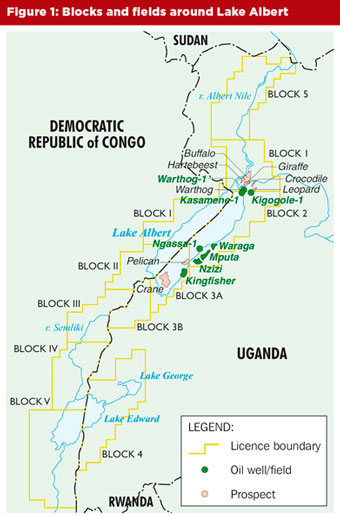
By The Independent Team
Interested company linked to bribery in Nigeria
Plans to start refining Uganda’s oil may be delayed because of wrangling over new partners by the exploration companies, Heritage Oil and Tullow Oil.
President Museveni in his New Year address to the nation on December 31, 2009, said plans to build a medium size oil refinery aimed at meeting domestic and regional petroleum demand are underway.
However, a report on the American wire news service Dow Jones said a leaked security ministry’s memo is reportedly warning the government against approving any deals yet.
The report, which cites the Ugandan security ministry memorandum, says President Yoweri Museveni hosted a November meeting in the country with Exxon Mobil executives to discuss the possible acquisition of a stake in Tullow’s acreage.
It says Tullow favours selling part of its concession to either US oil company Exxon Mobil Corporation or France’s Total SA because both are experienced in developing pipelines and refining projects, and both have strong financial capacity.
Tullow and Heritage are equal partners in Blocks 1 and 3A in the Lake Albert area. Tullow independently owns the Block 2 concession.
Initially, the Italian company, Eni SpA (E) had been invited and entered into Tullow’s Data Rooms which contain confidential information as part of its due diligence process for buying a stake in Uganda’s oil ventures.
At the time, Tullow’s chief executive Aidan Heavey said the company had a list of about 10 companies pre-qualified for bidding.
Apart from ENI, CNPC, Sinopec, Total, KNOC, StatoilHydro were mentioned.
On October 23 another US-based business news wire service, Bloomberg, quoted Tullow saying the Uganda government had approved an initial list of companies interested in bidding for a stake in its projects.
ENI, which is Italy’s largest industrial company, is 30% owned by the government. It operates in 70 countries including Libya, Nigeria, Congo, Mozambique, and Angola in Africa. It is also the third largest refiner in the world after Royal Dutch Shell and Total S.A.
Eni CEO, Paolo Scaroni was in Uganda in August and met with President Museveni where he showed off his company’s technological and operational capabilities in the oil and gas sector. At the time, the Eni boss said it was interested in building a 100,000 barrel-a-day refinery in Uganda and a 1,300-kilometer pipeline to the Kenyan port of Mombasa. A railway line and roads are also planned for the oil region.
President Museveni reportedly encouraged Eni to invest in Uganda and promised to support its interests.
Eni is not a total stranger to Uganda. Its subsidiary, Agip operated several downstream operation including fueling stations until 2000 when Shell Uganda acquired its assets in Uganda, Kenya, Ethiopia, and Eritrea.
But then Heritage, run by Tony Buckingham, a former mercenary, in November 2009 signed a letter of intent to sell its share of the fields to Eni for US$1.35 billion (Approx. Shs 3 trillion). That money is equal to about half of the Uganda national budget for FY2009/10 which is Shs7.3 trillion.
Analysts said, however, that price undervalued the potential of the Lake Albert assets.
Tullow countered the Heritage move with an announcement that it was ‘seriously considering’ invoking its pre-emption rights to buy Heritage’s share.
Such an arrangement would mean that Tullow either matches or exceeds Eni’s offer to Heritage.
Oil companies are competing for new reserves in Africa to make up for dwindling resources and restricted access in other parts of the world.
The Dow Jones newswire says the government has been warned against the Eni-Heritage deal because, according to the security memo, the deal could hurt the country’s economy.
An ENI oilfield service unit, Snamprogetti, was part of a group linked to an international investigation into alleged bribes of US$180 million paid to obtain contracts worth more than US$6 billion to build Nigerian oil facilities.
Up to 2 billion barrels of oil have been discovered by various explorers and more oil is yet to be discovered in the Lake Albert Rift Basin, according to Tullow estimates. Heritage’s share of discoveries there amounts to 300 million barrels of oil.
Challenges like the absence of oil development and export infrastructure remain over its exploitation.
Tullow and the government have said they plan to build a mini-refinery producing between 5,000 and 10,000 barrels a day in Uganda by 2012. There are also plans to construct an oil pipeline and improve the rail system to export crude through Mombasa Kenya in about five years.
 The Independent Uganda: You get the Truth we Pay the Price
The Independent Uganda: You get the Truth we Pay the Price





